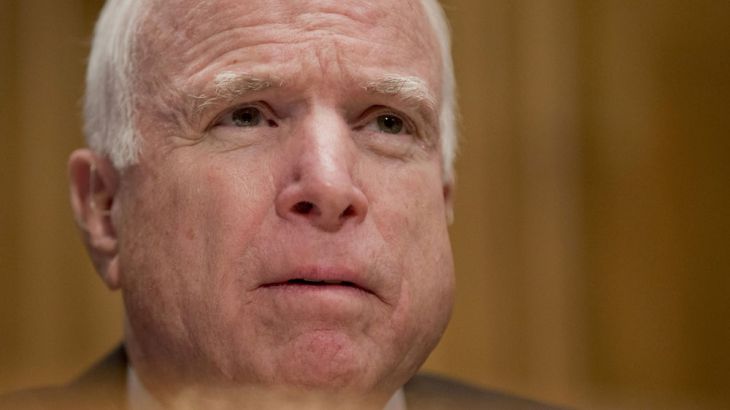John McCain: Hero at home, hawk in Middle East
Veteran senator dies at 81 from brain cancer after an eventful life that saw him go from POW to presidential candidate.

The US has no royalty but the late US Senator John McCain was born into the closest thing the country has to an aristocracy.
He began life in 1936 at a US naval base located next to the Panama Canal; the grandson of a four-star US Navy admiral and the son of a naval officer, who would also become an admiral.
A young McCain followed in that family tradition, joining the navy and earning his wings as a naval pilot, who went on to fly a ground-attack jet during the Vietnam War.
His first brush with death came during the war in July 1967 when a missile fired accidentally on board the aircraft carrier, USS Forrestal, sparked a series of explosions and fires that killed 134 sailors.
His second came just three months later when a missile hit the jet he was piloting, forcing him to eject into a lake in the North Vietnamese capital, Hanoi.
McCain narrowly avoided drowning, but his rescuers took him as a prisoner of war at the Hoa Lo Prison, which earned the infamously ironic nickname the ‘Hanoi Hilton’.
The future Republican presidential candidate spent more than five years there, enduring torture but refusing an expedited release on account of his background.
“I just knew it wasn’t the right thing to do,” he is later reported to have said.
“I knew that they wouldn’t have offered it to me if I hadn’t been the son of an admiral.”
The experience in Hanoi instilled in him a lifelong opposition to torture. As a US senator, McCain spoke out against its use against terrorism suspects during the US-declared “War on Terror”, which followed the September 11 attacks.
![John McCain after he was released from North Vietnamese detention [Horst Faas/AP Photo]](/wp-content/uploads/2018/08/6438b18c9cae4d68a6140f35a435d072_18.jpeg)
Hawkish stance
But the war in Vietnam did not change his hawkish foreign policy positions.
After his election to the US Senate in 1987, representing the state of Arizona, McCain backed US military intervention from the first Gulf War to the later invasions of Afghanistan and Iraq.
When anti-war protesters stormed a Senate hearing where former US Secretary of State Henry Kissinger was speaking, McCain ordered that they be escorted out of the hall by police and condemned the activists as “low-life scum”.
The senator was also a dedicated supporter of Israel and was quick to back US President Donald Trump’s decision to move the US embassy in Israel from Tel Aviv to Jerusalem.
“I have long believed that Jerusalem is the true capital of Israel,” he wrote in a statement on his website after the announcement.
The support extended to Israel’s numerous offensives against Palestinians, including the 2014 bombardment of Gaza, which killed more than 2,250 residents of the besieged territory, the vast majority of them civilians.
Sections of the US media labelled him a “maverick” for his seemingly independent streak but he was also noted for his ferocious temper, which spared few, even those close to him.
At a Republican fundraiser in 1998, he joked about the then-US President Bill Clinton’s daughter, Chelsea, calling the teenager “ugly”.
He is also reported to have called one fellow Republican senator a “f***ing jerk” and another an “a**hole”.
None of those purported incidents did much to harm his political career.
![John McCain on the 2008 campaign trail [Brian Snyder/Reuters]](/wp-content/uploads/2018/08/45ddd770cdc94ed7b1e7c4b8c83e37ea_18.jpeg)
Following an unsuccessful attempt in the 2000 Republican primaries, McCain secured the party’s nomination for the 2008 presidential election.
His choice of running mate, a little known Republican governor from Alaska named Sarah Palin, raised eyebrows within the party’s mainstream.
The pair would lose to former President Barack Obama in a landslide.
Palin went on to break with McCain on many issues, and establish herself as a key figure on the party’s hard-right.
Opposition to Trump
Faced with the party’s accelerating rightward shift, in later years McCain positioned himself as a centrist within the party, and as an opponent of the populist platform that won Trump his nomination for the 2016 election.
Trump sent his “deepest sympathies and respect” to McCain’s family on news of his death but the two had an acrimonious relationship.
The US president was widely condemned for dismissing McCain’s experiences in Vietnam, a war he had himself avoided with educational and medical deferments.
“He’s not a war hero. He was a war hero because he was captured. I like people who weren’t captured,” Trump said of McCain’s service record while on the 2016 campaign trail.
After Trump’s election, McCain continued to oppose Trump policies, such as the travel ban on citizens from several majority Muslim states, and voting against the US president’s attempt to repeal the Affordable Care Act.
When Trump railed against the media, accusing many outlets of spreading “fake news”, McCain hit back.
“When you look at history, the first thing dictators do is shut down the press,” he said.
The US senator’s final chapter began in 2017 with an announcement that he had brain cancer and was going to reduce his duties in the Senate, as he underwent treatment.
On August 24, McCain’s family announced that treatment for his illness would discontinue and a day later, announced his death.
Several sources suggest McCain’s widow, Cindy, will take up his seat in the Senate, until the seat goes up for election in 2020.
As speculation grows over what his passing means for the Republican party, tributes continued to flow in, including from his 2008 rival.
“Few of us have been tested the way John once was, or required to show the courage that he did,” wrote former President Obama.
“Michelle and I send our most heartfelt condolences to Cindy and their family.”
![McCain opposed Trump on several of his key platform pledges [Reuters]](/wp-content/uploads/2018/08/7c1c7e846dcb4102aa8feb103ff74cfd_18.jpeg)